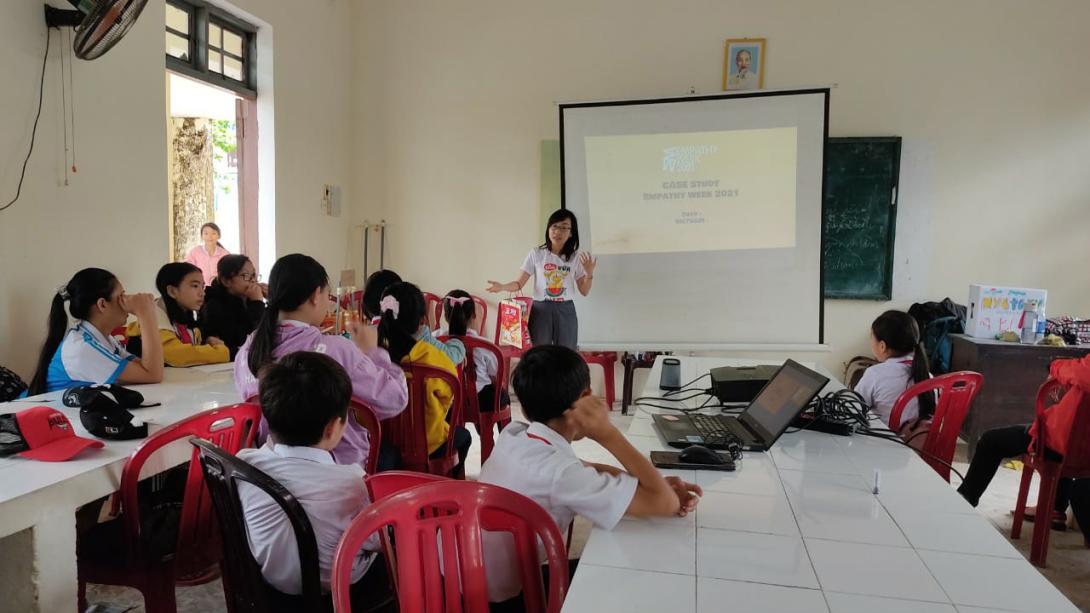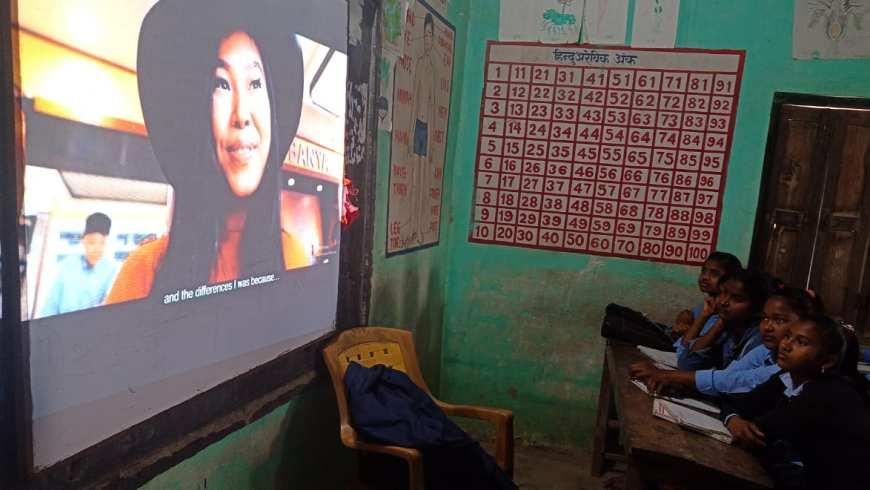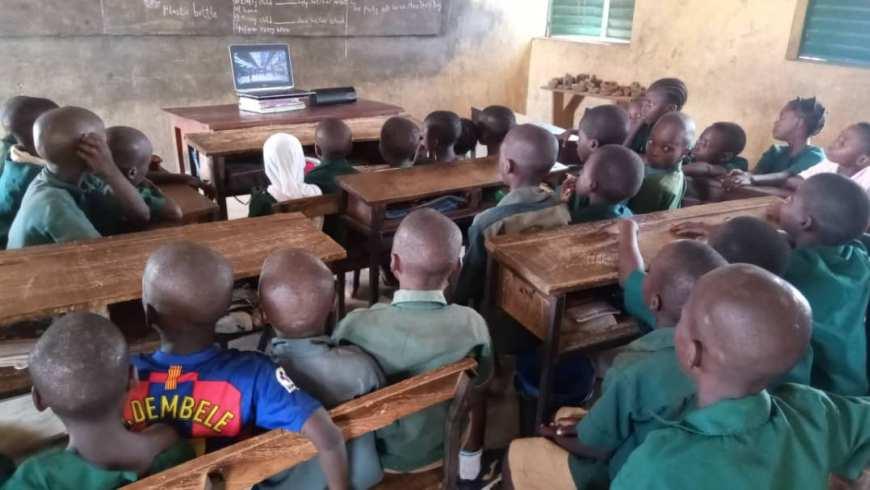Teach For All Network Teachers are Building the ‘Empathy Generation’ Around the World

Empathy Week, founded by Teach First alumnus Ed Kirwan, is a global schools initiative that uses the power of film to develop the skills of empathy, leadership, and resilience in young people. Since 2020, Empathy Week has reached schools in over 40 countries across six continents, engaging thousands of students and teachers with the opportunity to help build and become part of the #EmpathyGeneration.
Ed and the Empathy Week team film and edit short cinematic/documentary-style films each year which all focus around five individuals in a specific country, offering insight into the lives, thoughts, feelings, emotions and perspectives of the protagonists that students would otherwise never hear or experience. The big vision? That every child who participates from the age of five until they leave school at 18 will have experienced 65 different people’s experiences, lives, thoughts, feelings and perspectives, enabling them to further develop their empathy each year and become global citizens who are empathetic leaders who understand and appreciate people who are different from themselves. (Watch the 2020 films here)
Empathy Week is spreading across the Teach For All network, and during the 2020/2021 school year a group of 17 Teach For All teachers and alumni became Empathy Week International teacher ambassadors. The cohort this year met once a month via Zoom, from across nine countries and five continents where they took part in a programme dedicated to providing professional development in the skills of leadership and, of course, empathy. A series of guest speakers, Empathy Week-themed workshops, and sharing of best practise was at the core of the programme. The ambassadors’ role outside of the meetings was to spread awareness of the importance of empathy as a powerful leadership skill for students to learn, and to take part in Empathy Week 2021 themselves with their students and schools.
Though Empathy Week was held in February, schools can still register for the programme until the end of 2021 school year. Teachers who register will receive access to the age-differentiated films, lesson resources, and activities, and can guide their students through their own empathy action projects with age-specific workbooks.
Below, Ankit Negi (Teach For India), Nestor Silverio (Enseña Ecuador), Karina Vargas (Enseña por México), Shreejita Shrivastava (Teach For India), Olademji Fatoki (Teach For Nigeria), Lamis Akouch (Teach For Lebanon), and Bhawana Shrestha (Teach For Nepal) share their experiences:
Why did you, personally, want to be part of the International Empathy Week Teacher ambassador programme?
Ankit: “I wanted to be a part of this activity as in my opinion empathy is a key element in developing students to become respectful, mindful, and responsible community members in school and in their life. I also think that by developing empathetic student leaders I will be able to create an environment in my classroom wherein students will observe, think, enact, and reflect on their actions, wherein they will listen closely to their peers and adults, wherein they are able to manage different feelings like sadness, frustration, and anger, and finally wherein they navigate social situations ethically and fairly.”
Bhawana: My interest to be involved in Empathy Week grew stronger because of one of the tragic incidents that happened during the global pandemic. A young girl committed suicide on Facebook Live in Nepal. Since the pandemic began, the teasing, bullying, harassment, and domination has increased on the virtual platforms. With no other options for children at that moment to receive an education other than online, I realized the adverse effects on them more than ever. The emotional and psychological breakdown that they are going through is huge. With no discussions about emotions in a very conservative society like ours, our school children are in need of a platform that gives them the right information, tools, and actions related to social-emotional learning and emotional intelligence.
I firmly believe that not just the children of Nepal but children all around the world need to understand empathy in action for them to grow up as individuals who can contribute to a better world tomorrow.

Oladimeji: I wanted to be part of the Empathy Week Community because it makes it easy for me to bring learners, parents, heads of school, and other stakeholders together to work collaboratively, irrespective of their differences, to learn from human stories and reflect on making necessary adjustments in their reactions to people and things - which is in line with my passion for combating the injustice of educational inequity. I hope to continue to deepen my impact on building the ‘Empathy Generation’ along with my fellow teacher ambassadors.
Did the Empathy Week ambassador programme meet your expectations?
Nestor: I believe the experience fulfilled my every expectation. I expected to meet a diverse group of educators from different countries who may be facing similar challenges. Throughout these months together, we have grown as a group, having the opportunity to learn and to listen to each other’s stories. Not only did I meet people from different cultures and perspectives, but also I saw each ambassador’s commitment with their students. We all face different challenges, but I believe it is inspiring to meet people on the way who look for the same brighter future.
Shreejita: Change is forged by committed individuals coming together over a shared goal, that's what I expect from my community. A group of like-minded people working towards a common goal and building a support structure for each other and themselves that will last way beyond the duration of this commitment.
Bhawana: The Empathy Week team as well as all the international teacher ambassadors are great to share your authentic self with. I look forward to our monthly meetings where we don’t just share our problems that we are dealing with at our schools and organizations and find solutions mutually, but we also are joined by inspiring experts who are working rigorously in the field. I have been able to make a few friends with whom I talk beyond the regular formal sessions and we are planning for some collaborative work.
How did Empathy Week live up to your expectations?
Karina: Empathy Week went beyond my expectations! I didn't just have the resources, but a way to promote the topic with my colleagues and students. This is not only for students, this is for the whole educational community! Each month I had the privilege to meet with fellows around the world who had the same ambition as me: seeing their students talk about their feelings and thoughts about life.
Empathy Week was a HUGE opportunity to support teachers on how to develop socio-emotional skills with our students. After the last five months, I discovered that the resources and people who designed it are very professional, and REALLY guide teachers on how to facilitate the lessons.
Lamis: It was really surprising for me how students interacted with the films during Empathy Week, knowing that the language might be an obstacle—but in the end it really wasn’t! We shared reflections after each film and they centered around the similarities we have in our own country as well. Students were giving solutions and being empathic with what they saw which was really surprising for me. In addition to that, some students really amazed me with their participation in class because I didn’t expect them to express themselves like they did. They found a safe place to be real without the fear of any judgment, and that was totally magnificent!
Oladimeji: What surprised me the most is that on the last day of the Empathy Week, willingly, all my learners requested that they have a one-on-one session with me so they can fully share what they are going through. I really do appreciate the high level of trust and confidence these learners have developed because of Empathy Week!

What were some of the most meaningful moments for you as part of this community as well as a teacher delivering Empathy Week in 2021?
Shreejita: The most meaningful moments for me were when I discussed the realities of many students in India with Ed. We talked about the way our kids live below $2 a day and education is a luxury they cannot afford. It reminded me why we do what we do and that we are building a community that is ready to show up, listen, and support you as you face challenges. This community is teaching all of us the meaning of community and leadership.
Another noteworthy memory was when Thao (Teach For Vietnam) and I bonded over the similar struggles that teachers face in forming authentic connections with their students, which showed me how we all are really in this together, no matter the distance.
Karina: It has to be watching the videos with my colleagues and the whole school who supported the Empathy Week here. Hearing students respond to the films with comments like these was just truly amazing:
"We have underestimated other people's feelings."
"If people feel different, the last thing they need is someone to make them feel worse."
"And sometimes it is not easy to be different."
Ankit: When we were reflecting on one of the films, I was so proud to hear some of the students who shared with us that Casteism is a form of Racism. I could see my students making a connection from the protagonist Natasha's life to their lives. Students shared about the importance of mental well-being during this global pandemic, and one of the students shared with us that it is okay/important for us "Not to feel okay every time,"—we are human beings and it is okay if I am not feeling great some days. When students shared about the importance of having a conversation for our mental well-being it made us feel so good.

What is next for you and your students after Empathy Week and the ambassador programme?
Ankit: We as educators sometimes expect our students to display student leadership in school when we haven't modeled what leadership actually looks like in action to them. After conducting Empathy Week in my school I have realized the importance of familiarising my students with some of the issues that the entire world is currently facing. For example, just discussing climate change in a classroom is not enough—we need to ask our students what next steps they are going as a group or as a community to take, and before that we as educators need to model out those next steps in front of them.
Nestor: My takeaway thought would be that empathy has the potential to change how we understand the world. And I hope my students will be as inspired as I was with Empathy Week. In some years, I may not be their teacher anymore, but I believe they will remember that there is beauty in diversity and resilience.
Bhawana: I shall always have this group as my support network with whom I can come back and share some of my concerns even after Empathy Week is over. Working on empathy used to be an individual effort for me striving to bring people together for what I believed in. As I joined the team of Empathy Week, it felt like a celebration.
Lamis: I had the chance to understand how good values with authentic people can make a great impact, like the snowball (in a good way) when people are gathered together for one purpose. Nothing is impossible and if we notice that we need to see change happening in our lives and in our communities, we should be a part of it. I won’t stop doing what I started with Empathy Week, and especially now after noticing how my students are interacting with it. I hope this activity continues and I support it until the end.
Empathy Week will be advertising its next ambassador programme for the 2021/22 academic year in May. To keep up to date and experience Empathy Week with your school, please sign up for their newsletter and register your school.



